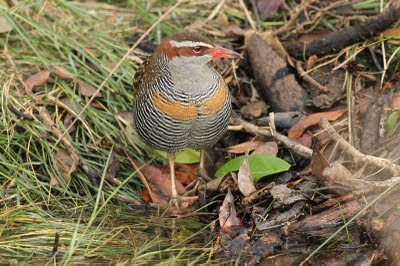Lord Howe Island

Australasian Grebe, the first since 1975.

Lord Howe Woodhen. This species almost went the way of the other, now extinct, endemics of LHI. If it wasn't for a rescue team plucking the last remaining pairs off the island's highest point in the eighties they wouldn't be roaming around the settlement today. If you're visiting the island and hoping to see one you shouldn't have any trouble, but I'd start with an early morning walk around the golf course. I guess I saw about 15 of the 200 population during our stay.

Golden Whistler. Not officially split from its mainland cousins but worth keeping a record of just in case.

Pied Currawong. Again not split and I'm sure with good reason. They definitely sounded different than their mainland relatives.

Silvereye. Or Lord Howe Silvereye depending on which list you subscribe to. I'm sticking to Walter's list so no extra tick... yet.

Whimbrel. There were two hanging around the airstrip and golf course for the whole week - a regular winter migrant to LHI.

Pacific Golden Plover. Again another visitor. Seven were hanging about the strip with a few Double-banded Plovers.

Bar-tailed Godwit. 7 migrants passing through.

Providence Petrels. The entire world's population of this species come home to roost on this peak every night (apart from a few on Norfolk Island). I'd seen Providence Petrels on the Wollongong boat before but this was quite a sight and sound to behold.

Providence Petrel

Red-tailed Tropicbird. I was happy to see a few of these beauties still hanging around before they disappear for a month or so.

Masked Booby. This was about as close as I got - close enough for a new tick but ay!

Black Noddy. There is a small group hanging around the Norfolk Island Pines at North Bay Beach.

Grey Ternlets. You have to get on a boat to see these little gems - something I only managed on the morning before we departed. Jack will take you. And if you like fishing, as I do, you can combine two loves on one boat (oo er). The fishing was so good I had to drop the camera.

Emerald Dove. The LHI resident population is notoriously confiding, and so it proved.

Song Thrush. Declining everywhere it seems. Even aussie birders don't seem to mind seeing this introduction. Reminded me of the old patch hearing these songsters repeating their phrases around the cemetery (not the old cemetry on Lagoon road - the one up near Ned's Beach). Counted five in all.

Buff-banded Rail. Amazing how many there are on the island. I still got a little buzz everytime I saw one - like getting ridiculously good views of a waterrail.

Sacred Kingfisher. Everywhere in numbers from the airstrip to the footy field to all the beaches and rocky outcrops.
Local bird expert, Ian Hutton, was very helpful with the gen for many of these birds, both in person and through his literature. Ian's books can be picked up at Joy's shop and the museum and well worth grabbing a copy if you're staying on the island.

2 Comments:
You leave those Whimbrels and Bar-Tailed Godwits to us Essex birders!
Nice pics! Hopefully some more this evening? Sarah
Post a Comment
Subscribe to Post Comments [Atom]